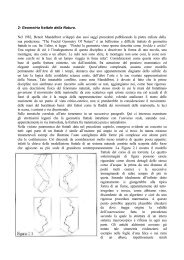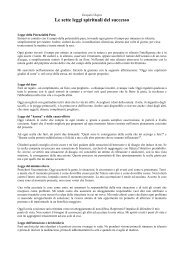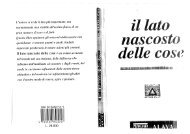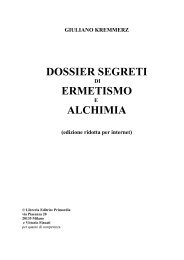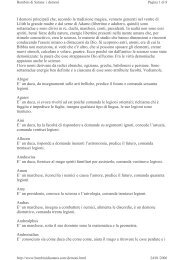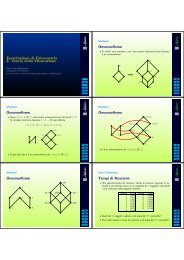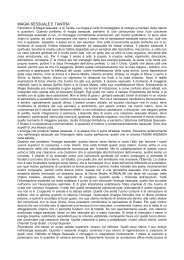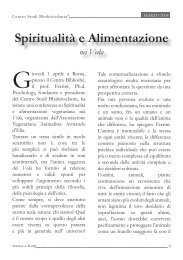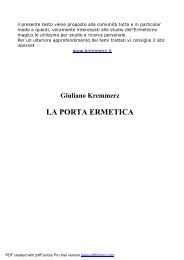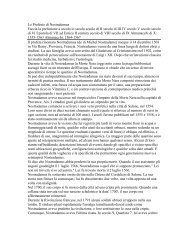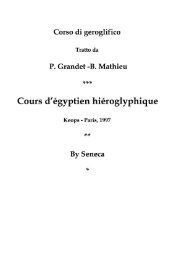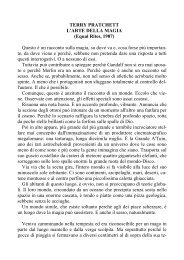52 ~ TALIBANPeacemaking always eluded Masud. He was a poor politician, incapableof convincing other Pashtun warlords who hated Hikmetyar that a Tajik-Pashtun alliance was the only feasible way to bring peace. Masud mayhave been a masterful military strategist but he was a failure at buildingpolitical alliances between different ethnic groups and parties. His majorproblem was that he was a Tajik. Except for one abortive uprising in1929, the Tajiks had never ruled in Kabul and were mistrusted by thePashtuns.In Kabul he remained aloof and refused to acccept government posts,declining the post of Defence Minister in President Rabbani's governmenteven though he commanded the army. 'There is an old Persian saying.When everyone is looking for a chair to sit on, it is better to sit on thefloor,' he told me in May 1996, just a few weeks before the Taliban wereto drive him out of Kabul. 'Pakistan is trying to subjugate Afghanistanand turn it into a colony by installing a puppet government. It won'twork because the Afghan people have always been independent and free,'he added.Working 18 hours a day with two military secretaries, who took it inshifts to keep up with him, he would sleep four hours a night and becauseof fears of assasination never spent two nights in the same location. Heslept, ate and fought with his men and invariably in the midst of a majorbattle he could be found on the frontline. In the next few months he wasto face his greatest challenge as the Taliban swept him out of Kabul andappeared to be on the verge of conquering the entire country. He survived,but by 1999, aged 46 years old, he had been fighting virtuallynon-stop for 25 years.Masud's forces now retreated up the Salang highway to his base area ithe Panjshir. As the Taliban pursued them, Masud's men blew up themountains, creating landslides to block the entrance to the valley. TheTaliban launched an abortive attack on the Panjshir but failed to makeheadway. They pushed up the Salang highway capturing towns along theway until they were blocked at the Salang tunnel by Dostum's forces, whohad advanced south from Mazar-e-Sharif. It was still unclear whose sideDostum would take and his forces refrained from engaging the Taliban.Mullah Rabbani met with Dostum on 8 October 1996 in a bid to tryand neutralize the Uzbeks while the Taliban went after Masud, but thetalks broke down. The Taliban refused to allow Dostum autonomy aHpower in the north. Pakistan also launched a diplomatic shuttle in a tto break Dostum away from Masud. However, Dostum realised that, dpite his differences with Masud, the Taliban posed the real threat tonon-Pashtuns. On 10 October 1996, deposed President Rabbani, Masud,Dostum and the Hazara leader Karim Khalili met in Khin ]an on thehighway and formed a 'Supreme Council for the Defence of the Mother'KABUL 1996: COMMANDER OS THE FAITHFUL ~ 53land' to counter the Taliban. It was the beginning of a new anti-Talibanalliance that would perpetuate the civil war.In their rapid advance northwards, the Taliban had spread themselvestoo thin and Masud took advantage of this, launching a major counterattackalong the highway on 12 October 1996. He captured several towns,killing and capturing hundreds of Taliban soldiers as they fled back toKabul in panic. On 18 October 1996, Masud's forces recaptured theBagram airbase and began to shell Kabul airport, even as Dostum's airforcebombed Taliban targets in Kabul. The heavy fighting resulted in thousandsof civilian casualties and forced 50,000 people to flee their homesin villages along the Salang highway. As these destitute refugees arrivedin Kabul, tens of thousands of Kabulis - mostly Tajiks and Hazaras - weretrying to escape in the other direction - eastwards to the Pakistan borderto escape Taliban reprisals and mass arrests which had begun in the city.Faced with rising casualties the Taliban began to suffer from manpowershortages and they started conscripting young men from Kabul into theirarmy, entering mosques and seizing worshippers. Thousands more volunteersarrived from Pakistan where some Pakistani ukma closed down theirmadrassas so that students would have no choice but to enlist en massewith the Taliban. Thousands of Pakistani students and Afghans from therefugee camps began to arrive daily in Kandahar and Kabul on buses hiredby Pakistan's Islamic parties. Pakistan waived all passport and visa requirementsfor them.Bolstered by this fresh support, the Taliban launched an attack in westernAfghanistan, moving northwards from Herat into Baghdis province.By the end of October 1996 Ismael Khan and 2,000 of his fighters, whohad been in exile in Iran, were flown into Maimana on Dostum's aircraftto defend the front line against the Taliban in Baghdis. Iran had rearmedand re-equipped Ismael Khan's forces in a provocative and deliberateattempt to bolster the new anti-Taliban alliance. As heavy fighting tookplace in Baghdis during November and December, with considerable useof air power by both sides, another 50,000 displaced people fled to Herat.This added to what was now a catastrophic refugee crisis for UN aidagencies as winter, heavy snows and fighting prevented the delivery ofhumanitarian aid.Despite heavy snowfall, the Taliban pushed Masud back from the outskirtsof Kabul. By the end of January 1997, they had recaptured nearlyall the territory they had lost along the Salang highway, retaking theBagram airbase and Charikar. Masud retreated into the Panjshir as theTaliban pushed up the highway to confront Dostum.The fall of Kabul and the intense fighting that followed created seriousapprehensions in the entire region. Iran, Russia and four Central AsianRepublics warned the Taliban not to move north and publicly declared
54 ~ TALIBANthey would help rearm the anti-Taliban alliance. Meanwhile Pakistan andSaudi Arabia sent diplomatic missions to Kabul to see what help theycould offer the Taliban. Appeals from the UN and other internationalbodies for a cease-fire and mediation failed to receive any hearing fromthe belligerents. The region was now deeply polarized with Pakistan andSaudi Arabia allied to the Taliban and the other regional states backingthe opposition. The Taliban were still not to receive the internationalrecognition they so desperately wanted. 'We don't have a friend in theworld. We have conquered three quarters of the country, we have capturedthe capital and we haven't received even a single message of congratulations,'said a wistful Mullah Mohammed Hassan. 17Yet it appeared that Mullah Omar's refusal to compromise with theopposition or the UN, along with his unshakeable faith and his determinationto achieve a military victory, had finally paid off. Kabul, thecapital of Afghan Pashtun kings since 1772 which had been lost for thepast four years to Tajik rulers, was back in the hands of the Pashtuns.The student movement, which so many had predicted would never beable to take the capital had done just that. Despite their enormous losses,the Taliban's prestige had never been higher. The cost of their victoryhowever was the deepening ethnic and sectarian divide that was clearlydividing Afghanistan and polarizing the region.'War is a tricky game,' said Omar, who remained in Kandahar anddeclined to even visit Kabul. 'The Taliban took five months to captureone province but then six provinces fell to us in only ten days. Now weare in control of 22 provinces including Kabul. Inshallah [God willing]the whole of Afghanistan will fall into our hands. We feel a militarysolution has better prospects now after numerous failed attempts to reacha peaceful, negotiated settlement,' he added. 18 Northern Afghanistan nowappeared ready for the taking.4MAZAR-E-SHARIF 1997:MASSACRE IN THE NORTHEveryone expected a Taliban spring offensive on Mazar-e-Sharif, thelast stronghold in northern Afghanistan of the anti-Taliban alliancewhich was under the control of General Rashid Dostum and hisUzbeks. During the long winter months there was growing panic in Mazaras food and fuel supplies ran out due to the Taliban blockade and theAfghani rate of exchange doubled to US$1 and then tripled as wealthyMazar citizens fled to Central Asia.Although most of Afghanistan's population is concentrated in thesouth and was now under Taliban control, 60 per cent of Afghanistan'sagricultural resources and 80 per cent of its former industry, mineral andgas wealth are in the north. During the last century, Kabul's control ofthe north had become the key to state building and economic development.For the Taliban, determined to conquer the country and keep itunited, the autonomy enjoyed by the northern warlords had to be crushed.Yet when the Taliban offensive finally came in May, nobody expectedthe bloody drama of betrayals, counter-betrayals and inter-ethnic bloodshedwhich was astounding even by Afghan standards and would send theentire Central Asian region into a tailspin.Ensconced during the winter in the Qila-e-Jhangi, the Fort of War,on the outskirts of Mazar, Dostum suddenly found himself promoted byneighbouring states and many Afghans as a saviour and the last hopeagainst the Taliban. Mazar, situated in the Central Asian steppe whichbegins north of the Hindu Kush, is culturally and ethnically as far awayfrom Kandahar as Kandahar is from Karachi. The nineteenth-century fortis a surreal pastiche of a European baronial castle with a moat and defenceditches and a fantasy from the Arabian Nights with its massive, mud-
- Page 1 and 2: YALE NOTA BENE"The broader storyher
- Page 3 and 4: TalibanMilitant Islam,Oil and Funda
- Page 5 and 6: Vi ~ CONTENTSChapter 8A Vanished Ge
- Page 7 and 8: AFGHANISTAN•^ UZBEKISTAN J TAJIKI
- Page 9 and 10: 2 ~ TALIBANaccounts for some 40 per
- Page 11 and 12: "6 ~ TALIBANgas riches of landlocke
- Page 13 and 14: 10 ~ TALIBANgious mix that was to m
- Page 15 and 16: Part 1History of theTaliban Movemen
- Page 17 and 18: 18 ~ ISLAM OIL AND THE NEW GREAT GA
- Page 19 and 20: 22 ~ ISLAM OIL AND THE NEW GREAT GA
- Page 21 and 22: 26 ~ ISLAM OIL AND THE NEW GREAT GA
- Page 23 and 24: 30 ~ ISLAM OIL AND THE NEW GREAT GA
- Page 25 and 26: 34 TALIBANKabul- Hikmetyar had alli
- Page 27 and 28: 38 ~ TALIBANrHERAT 1995: GOD'S INVI
- Page 29 and 30: 42 ~ TALIBANdo manage to take Kabul
- Page 31 and 32: J46 ~ TALIBANgreater weight to UN e
- Page 33: 50 ~ TALIBANas they hung from steel
- Page 37 and 38: 58 TALIBANGul Mohammed Pahlawan, Gh
- Page 39 and 40: 62 TALIBAN2,500 Taliban, who had re
- Page 41 and 42: 66 TALIBANshould throw all aid agen
- Page 43 and 44: 70 ~ TALIBANyears of battle and hel
- Page 45 and 46: 74 ~ TALIBANThousands of Hazaras we
- Page 47 and 48: 78 TALIBANhas become a plague,' sai
- Page 49 and 50: NEW STYLE FUNDAMENTALISM OF THE TAL
- Page 51 and 52: 86 TALIBANsity students - Hikmetyar
- Page 53 and 54: 90 TALIBANSharia was heavily influe
- Page 55 and 56: 94 TALIBANinflamed the debate in th
- Page 57 and 58: 98 TALIBANizing factor of Islam, it
- Page 59 and 60: 102 TALIBANadministrations made the
- Page 61 and 62: 106 ~ TAUBANfrom working, but it no
- Page 63 and 64: TALIBANUniversity, she held down a
- Page 65 and 66: 114 TALIBAN A VANISHED GENDER 115Ta
- Page 67 and 68: 118 TALIBANUS$1,300 - a small fortu
- Page 69 and 70: 122 TALIBANper cent of the total Pa
- Page 71 and 72: 126 TALIBANequipment, no electricit
- Page 73 and 74: 130 ~ TALIBANfight with the Mujahed
- Page 75 and 76: 134TALIBANAugust 1996 noted that Bi
- Page 77 and 78: 138 ~ TALIBANwho were using the Kho
- Page 79 and 80: 11DICTATORS AND OILBARONS: THE TALI
- Page 81 and 82: 146 TALIBAN DICTATORS AND OIL BARON
- Page 83 and 84: 150 — TALIBANgrowth of beards and
- Page 85 and 86:
154TALIBAN1998 when international o
- Page 87 and 88:
158 ~ TALIBANaround Afghanistan? Af
- Page 89 and 90:
162 TALIBAN ROMANCING THE TALIBAN 1
- Page 91 and 92:
166 TALIBAN ROMANCING THE TALIBAN 1
- Page 93 and 94:
ROMANCING THE TALIBAN 2: 1997-99 17
- Page 95 and 96:
174 — TALIBANnon-Russian pipeline
- Page 97 and 98:
178 — TALIBANROMANCING THE TALIBA
- Page 99 and 100:
182 ~ TALIBANApril 1999. 'The US ha
- Page 101 and 102:
186 ~ TALIBANters or the transport
- Page 103 and 104:
190 ~ TALIBANThis Wild West of free
- Page 105 and 106:
194 ~ TALIBANgovernance. Pakistani
- Page 107 and 108:
198 TALIBAN SHIA VERSUS SUNNI: IRAN
- Page 109 and 110:
202 TALIBAN SHIA VERSUS SUNNI: IRAN
- Page 111 and 112:
206 — TALIBANin Afghanistan - to
- Page 113 and 114:
210 — TALIBANand antagonism. The
- Page 115 and 116:
214 ~ TALIBANdrawn since 1996 - a P
- Page 117 and 118:
218 ~ TALIBANated and severely puni
- Page 119 and 120:
Origins of Members of the Taliban M
- Page 121 and 122:
APPENDIX 3 ~ 227Appendix 3A CHRONOL
- Page 123 and 124:
230 ~ TALIBANgraves near Shebarghan
- Page 125 and 126:
234 ~ TALIBAN8 June. US FBI places
- Page 127 and 128:
238 ~ TALIBAN1995 January16 MarchAp
- Page 129 and 130:
242 ~ TALIBANJune21 August10 Septem
- Page 131 and 132:
246 ~ TALIBANDupree, Nancy Hatch, A
- Page 133 and 134:
250 ~ NOTESChapter 31 Interview wit
- Page 135 and 136:
254 ~ NOTESmuddin, Religious Police
- Page 137 and 138:
258 NOTES13. The Japanese company M
- Page 139 and 140:
262 ~ NOTES28. Waxman, Sharon, 'A c
- Page 141 and 142:
Abbas, Mulla Mohammed 22,61,100Abda
- Page 143 and 144:
INDEX - 270Hazaras (continued)burea
- Page 145 and 146:
INDEX ~ 274nF»r\/FaliViar» milita
- Page 147:
INDEX ~ 278Talibans (continued)Sunn




